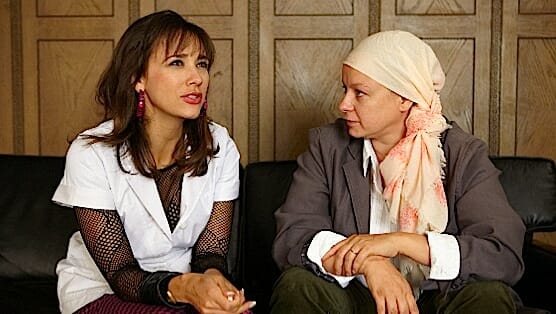Decoding Annie Parker

Decoding Annie Parker boasts a deep roster of recognizable faces. This speaks to the enormous potential of its material, which is rooted in the true story of a three-time cancer survivor and the scientific discovery of the hereditary breast cancer gene. In the hands of a first-time feature director with no overarching idea of how to wrangle disparate narrative strands into the shape of anything consequential, however, this well-meaning but hopelessly disjointed period drama comes to resemble nothing so much as a Lifetime movie run amok and off the tracks, unfolding in maddening fits and starts under a series of problematic wigs and skullcaps.
Samantha Morton stars as the title character, a Toronto high school graduate who in the early 1970s marries her pool-cleaning, would-be-singer-songwriter boyfriend, Paul (Aaron Paul), and in short order becomes pregnant. After having lost first her mother and then her older sister, Joan (Marley Shelton), to breast cancer, Annie is devastated when she too is diagnosed with the disease. While the medical establishment scoffs at any sort of inherited connection, and her husband struggles with how to relate to her, Annie goes to school on cancer and finds sympathetic embrace from a progressive-minded doctor (Corey Stoll) and former oncology nurse (Rashida Jones). Meanwhile, thousands of miles away, university professor and research geneticist Mary-Claire King (Helen Hunt) works with her team, trying to prove a hereditary link in breast cancer.
Decoding Annie Parker isn’t honestly interested in science, though that’s certainly no great crime. The oversimplification of King’s research and almost haphazard way in which it is interwoven into the narrative, however, as a mock-intellectual adjunct to Parker’s story, makes it feel like some odd obligation, a paid-off bet. Truth be told, there’s little reason for King’s story to be paired with Parker’s here, other than the fact that they topically overlap and both cover more than a decade. The characters meet once, briefly. In stretching to wanly accommodate various markers of biopic cinema, though—Annie’s betrayal by a friend (Alice Eve), and her relationship with a second husband (Bradley Whitford)—the movie shortchanges any legitimate chance at establishing a parallel dramatic pillar.
To that end, Hunt has little to do, save float above the picture in a glorified cameo, with alternately puffed-up and impatient expressions. Paul, meanwhile, is first stuck under a Halloween-style Jared Leto wig, and then saddled with a Billie Joe Armstrong look that seems wrong for the era. Morton is an anchoring presence, and undeniably the film’s strongest selling point; she throws herself into the role and wrings a couple moving moments out of the material here and there, particularly in relation to Annie’s desexualization after her second bout of chemotherapy. But it’s not enough, and the actors are by and large all undone by Steven Bernstein’s unsettled, kitchen-sink directorial approach.
-

-

-

-

-

-

-

-

-

-

-

-

-

-

-

-

-

-

-

-

-

-

-

-

-

-

-

-

-

-

-

-

-

-

-

-

-

-

-

-








































